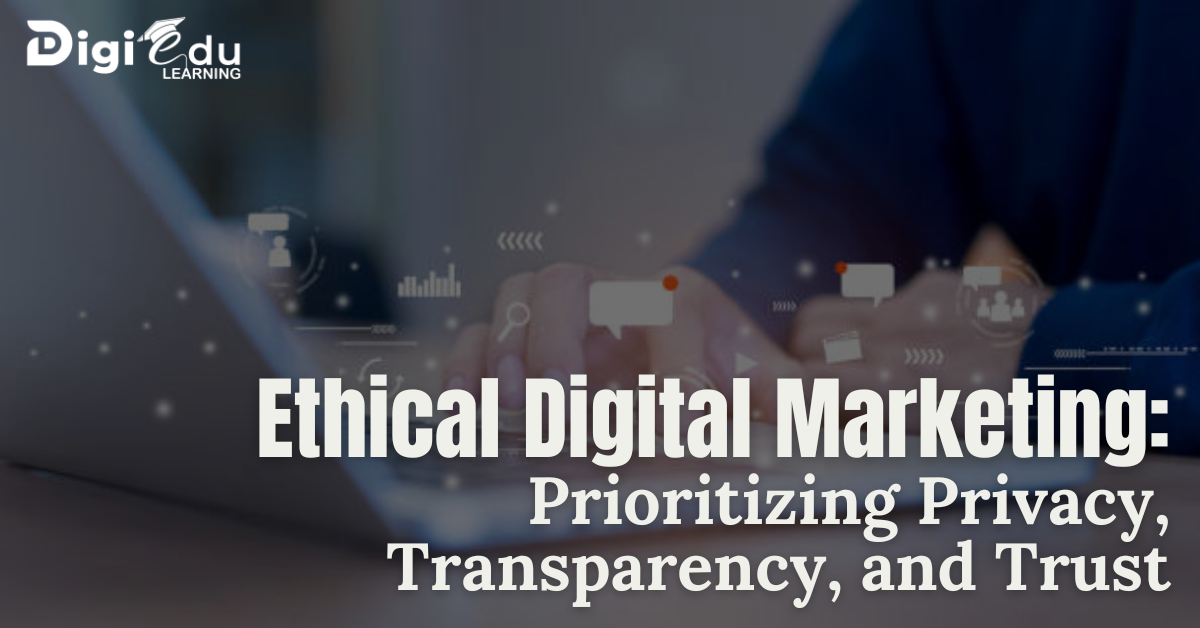Advanced showcasing has reformed the manner in which organizations collaborate with their clients. Businesses can reach their target audience in a more personalized and efficient manner with the assistance of a variety of ethical Digital Marketing channels, such as email marketing, social media marketing, search engine optimization (SEO), and search engine marketing (SEM). However, as the use of digital marketing grows in popularity, it has become increasingly essential for businesses to ensure that their marketing strategies are honest, open, and dependable.
In this blog entry, we will examine the morals of computerized showcasing and how organizations can guarantee security, straightforwardness, and confidence in their advertising rehearses.
1. Protection In Computerized Showcasing
Protection is a principal basic freedom, and it is fundamental for organizations to regard the security of their clients. The protection of personal information that customers share with businesses when they interact with them online is referred to as privacy in the context of digital marketing.
Concerns about privacy arise primarily in Digital Marketing because businesses collect and use personal data. Individual information can incorporate data, for example, name, address, telephone number, email address, and perusing history. Organizations gather this information to further develop their advertising endeavors by conveying more significant and customized content to their clients.
In any case, organizations should be straightforward about the information they gather and how they use it. Businesses should only collect the data necessary for their marketing efforts, and customers should have control over their personal information. Also, organizations ought to do whatever it may take to shield their clients’ very own information from unapproved access, use, or revelation.
2. Straightforwardness In Computerized Showcasing
Straightforwardness is a critical part of moral computerized showcasing. It refers to businesses’ honesty and openness regarding their marketing strategies. Transparency is essential when it comes to personal data collection and use, marketing communications, and product or service benefits.
Information about how their data is collected, including what data is being collected, how it is being collected, and how it is being used, should be clear and concise from businesses. Customers should also be able to opt out of receiving marketing or data collection messages from businesses.
Businesses’ marketing messages to their customers should also be transparent. Organizations ought to guarantee that their advertising messages are honest and not misdirecting. They should not engage in deceptive marketing strategies or make exaggerated or false claims about the advantages of their products or services.
3. Trust In Computerized Advertising
Trust is the groundwork of any fruitful business-client relationship, and it is fundamental for organizations to lay out and keep up with trust in their advanced showcasing rehearses. Customers ought to have faith that businesses will use their personal data in an ethical and responsible manner, and that marketing messages will not deceive.
Providing customers with a positive and individualized experience and being transparent about their marketing strategies are two ways that businesses can build trust. They should also respond to questions and concerns from customers and take precautions to prevent unauthorized disclosure or access to their customers’ personal information.
4. Ethical Concerns In Digital Marketing
Despite its numerous advantages, digital marketing also raises a number of ethical issues. Digital marketing raises a number of concerns, including:
- Information protection and security: Personal data must be collected and used in a responsible and ethical manner by businesses, and they must safeguard customer data from unauthorized access or disclosure.
- Choosing vulnerable groups to focus on: Businesses should ensure that their marketing messages are not exploitative or deceptive, and they should avoid targeting vulnerable populations like children, the elderly, and people with disabilities.
- False advertising methods: Deceptive marketing techniques and exaggerated or false claims about the benefits of a product or service should be avoided by businesses.
- Advanced enslavement: Digital marketing strategies that promote addictive behaviors or harm customers’ mental health or well-being should not be used to exploit customers.
- Cultural awareness: Businesses should be aware of cultural differences and avoid using marketing messages or images that are offensive to some cultures or groups or are inappropriate for them.
- Natural obligation: The energy consumption and carbon footprint of their servers and data centers should all be taken into account when considering the environmental impact of digital marketing strategies.
5. How Businesses Can Ensure Ethical Digital Marketing Practices
In order for businesses to ensure ethical digital marketing practices, they should:
- Create a comprehensive privacy policy that explains how they collect and use data in a clear way and gives customers control over their personal information.
- Guarantee that their advertising messages are honest and not deceiving, and that they don’t participate in misleading promoting rehearsals.
- Provide customers with the option to opt out of receiving marketing messages or data collection and be transparent about their marketing practices.
- Abstain from focusing on weak populaces or utilizing promoting messages that empower habit-forming ways of behaving or actually hurt their emotional well-being or prosperity.
- Be culturally sensitive and steer clear of using marketing images or messages that are offensive to certain groups or cultures.
- Take into account the effects that their digital marketing strategies have on the environment and take steps to reduce their energy use and carbon footprint.
Conclusion:
While digital marketing has emerged as an indispensable component of modern business, it is critical to ensure that it is carried out in an ethical and responsible manner. As a responsible and ethical business, Digi Edu Learning recognizes the significance of safeguarding customer privacy and fostering trust in digital marketing practices.
Digi Edu Learning will develop a comprehensive privacy policy, avoid deceptive or harmful marketing practices, and be transparent about their marketing activities to guarantee ethical digital marketing practices. Digi Edu Learning will build a solid and trustworthy relationship with their clients by prioritizing ethical behavior.
Businesses must remain vigilant in their commitment to ethical digital marketing practices as the digital landscape continues to change. Businesses like Digi Edu Learning can succeed in developing a strong and long-lasting relationship with their customers, which is essential to their long-term success. This can be accomplished by prioritizing the interests of the customer and adhering to ethical standards.






